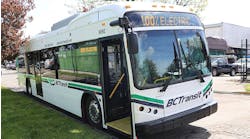Stantec selected to lead two strategic plans for transit-oriented communities under FTA grant program
Stantec’s Urban Places practice has been contracted to lead two transit-oriented communities (TOC) programs.
The two projects, located in Raleigh, N.C., and Riverside, Calif., are funded through the Federal Transit Administration’s (FTA) competitive transit-oriented development planning grant program, and reflect an expanded priority to increase transit access and mixed-use, mixed income developments in cities across the United States.
The planning programs will support the FTA’s stated goals of increasing access to affordable housing options, combating climate change, advancing environmental justice initiatives and promoting equitable delivery of infrastructure to underserved communities.
While traditionally referred to as Transit-Oriented Development (TOD), Stantec says many cities are shifting focus to a community-centric planning process known as TOC to examine all aspects of community life where transit can be the predominate choice in mobility options.
For each planning project, Stantec is identifying barriers to building transit-supportive mixed-use development and better connecting communities to planned, existing or new transit investments. This includes strategies such as engTODaging members of the community on their needs, examining ways new developments are approved, looking at regulations for parking or development that limit new development opportunity, recommending approaches to mitigate the adverse effects of gentrification and understanding the physical barriers to better connect residents to transit.
In Riverside, the TOC plan will address the Metrolink commuter line connecting communities in Riverside County to Los Angeles and Orange Counties for the Riverside County Transportation Commission (RCTC).
The study area includes eight stations along the 91/Perris Valley Lines, from Corona - West to Perris - South, connecting through downtown Riverside. The historically suburban development pattern along the line ranges from higher density, walkable streets to large, undeveloped properties along the eastern end of the line.
The study will be guided by three advisory committees and a robust public engagement program, and will examine smart mobility solutions, economic development strategies and specific infrastructure investments that will remove barriers to implementing transit-oriented communities.
“The price of a single-family home in Riverside County has jumped over 30 percent in just the last year while wages have remained flat, making it increasingly difficult for many buyers to afford to live in the Inland Empire,” said Adam Maleitzke, Stantec’s project manager for the RCTC TOC Strategic Plan. “California is in a housing crisis, and this process is an opportunity to promote inclusive communities. The TOC Strategic Plan will be a resource for jurisdictions as they plan for a variety of new housing options, allowing more residents to live in walkable, affordable communities with excellent access to transit.”
In Raleigh, design is underway to add a bus rapid transit (BRT) route along New Bern Avenue, which is set for completion in 2023. The new high-frequency transit corridor is the first of many for Raleigh. With this new investment in rapid transit, the communities along New Bern are poised for new development and redevelopment.
Stantec’s process will be guided by the city’s Equitable Transit-Oriented Development Playbook, and will identify recommended zoning changes, new or expanded housing affordability and equity programs, urban design strategies, necessary first/last mile safety improvements and other related considerations that will further support the investment of BRT along New Bern Avenue.
“Continued investment from government agencies to build better transit across the U.S. bodes well for the future of urban development,” said Craig Sklenar, project manager for the New Bern Avenue Station Area Planning project. “A holistic planning approach that considers community impact will yield improved outcomes – from better mobility options to opportunities for new amenities, housing and jobs that meet the growing needs of evolving urban communities.”


